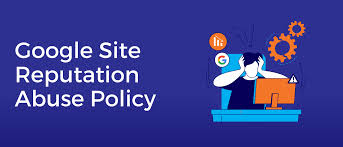Google has announced a significant update to its **site reputation abuse policy**, which now explicitly includes cases involving first-party involvement or oversight of content. This change aims to enhance the integrity of its platforms and provide clearer guidelines for content creators, publishers, and advertisers regarding acceptable practices.

Expanded Scope of the Policy
The updated policy broadens the definition of site reputation abuse, focusing on scenarios where a platform or publisher exercises direct control or influence over harmful or deceptive content. In the past, Google’s policy primarily targeted third-party content abuse, such as spam or deceptive practices orchestrated by external actors. However, the inclusion of **first-party involvement** ensures accountability for platforms and entities managing their own content.
This means that websites engaging in activities such as publishing misleading information, promoting fraudulent services, or failing to moderate harmful user-generated content may face penalties, even if the platform is the primary creator or overseer of the material.
What the Update Means for Content Publishers
For content publishers, this update signals a need for heightened responsibility in managing both user-generated content and original material. Google’s stricter stance means platforms must ensure their editorial practices align with the following:
– Accuracy and Authenticity- Platforms must prioritize factual accuracy and avoid spreading false or deceptive information.
– Transparency- Websites are encouraged to disclose affiliations, partnerships, or sponsorships that may influence content.
– User Safety- Platforms must take steps to moderate harmful, abusive, or illegal content, even if it originates from internal teams.
By extending the policy to include first-party involvement, Google emphasizes that all parties contributing to the online ecosystem must adhere to the same standards of integrity.
The Growing Importance of Policy Updates
Google’s latest move reflects its ongoing efforts to combat misinformation, fraud, and harmful practices across its platforms. In recent years, the company has faced mounting scrutiny from regulators, advertisers, and users regarding the role of online platforms in disseminating harmful content.
By holding first-party entities accountable, Google aims to mitigate risks associated with unchecked content production and management. This aligns with broader industry trends where major tech companies are increasingly adopting stricter content policies to protect users and maintain trust.
Implications for the Broader Digital Ecosystem
This policy update could have far-reaching implications for the digital ecosystem. Platforms and publishers may need to invest more resources into content moderation, fact-checking, and compliance monitoring to meet Google’s standards.
For smaller entities, this could pose challenges due to limited resources. However, the overall goal is to foster a safer and more reliable online environment, benefiting both users and responsible publishers.
Google’s inclusion of first-party involvement in its site reputation abuse policy marks a significant shift in its approach to content accountability. By extending its scope to cover direct oversight and management of content, the company underscores the importance of ethical practices in digital publishing.
As this policy takes effect, publishers and content managers are encouraged to review their practices, implement robust moderation strategies, and prioritize transparency to align with Google’s expectations. The changes highlight Google’s commitment to fostering trust and integrity within the online space, setting a precedent for how platforms should manage their content moving forward.










Add Comment